IAMCR 2022 pre-conference: Digital Governance and Transcultural Communications
Release Date: 2022-07-12Views:
The IAMCR 2022 pre-conference, "Digital Governance and Transcultural Communication," was successfully held online on Friday, July 8th, 2022, from 08:00-21:40 (Beijing time).
Organized by the School of Journalism and Communication of Beijing Normal University and the Public Service Media Policies Working Group of IAMCR, the pre-conference invited 17 international scholars to explore policy and governance strategies emerging from the development and use of digital communications technologies and their impacts on transcultural communications, with a focus on the themes of neo-globalization, digitalisation, and platformisation.
The conference was opened by Professor Hongzhong Zhang, Dean of the School of Journalism and Communication at Beijing Normal University, and Dr. Fiona Martin, Co-Chair of the IAMCR Public Service Media Policies Working Group. Professor Zhang introduced Beijing Normal University as a comprehensive century-old university about to celebrate its 120th anniversary. The School of Journalism and Communication, founded in 2014, has been established for a short period but has outstanding advantages. In the context of the rapid development of modern media, the School of Journalism and Communication is capable of devoting more research energy to the frontier of communication research. The recently created Platform for Communication Innovation and Future Media seeks to explore the direction of Internet development and its impact on the future of humanity from a cross-disciplinary perspective. Dean Zhang expressed that being able to hold the pre-conference of IAMCR is indispensable to the confidence of the Public Service Media Policies working group and the efforts of Dr. Yik-Chan Chin and all the faculty.
Dr. Martin Introudued Public Service Media Policies working group as a global professional organization of researchers of excellence in the field of media and communication research. seeks to promote media and communication research worldwide, addressing sociopolitical, technological, policy, and cultural processes. The group is highly interested in the Internet and in transcultural communication because these issues intersect with the future of public service media. The diversity of potential audiences can be addressed more effectively. One can see the holding of this conference as evidence that this type of international cooperation and transcultural communication is happening. This is a very positive thing.
They both congratulated the IAMCR Pre-Conference for the first time to be held in mainland China and hoped that the International Association for Media and Communication Research (IAMCR) would explore more interaction and collobration with Chinese scholars.

Professor Ang Peng Hwa from the School of Communication and Information at Nanyang Technological University in Singapore delivered the keynote speech on how digital media is in a crisis due to technology giants in a dying democracy. What can we do about it?

Speakers in the conference expressed that digital media are bound to impact different groups in their perceptions and behaviors in a transcultural context. The governance of digital media and the formulation of legal systems and international policy cooperations have become critical issues.
Effectively regulating false information in different markets, protecting personal information, improving infrastructure standardization in digital communication, and strengthening public service digital platforms are also challenges to digital governance.
Deepening international cooperation among digital media and promoting changes in international legislation, anti-monopoly, and regulatory systems for digital media are essential policy adjustments facing countries worldwide.
The conference has four panels.
The first panel:
Governance strategies for safe, inclusive digital transcultural communications
Moderator: Prof Min Zhou, BNU; Discussant: Dr. Miao Liu, BNU

Speakers:
Dr. Undrah Baasanjav, Southern Illinois University Edwardsville
Dr. Iderjargal Dashdondog, National University of Mongolia
Dr. Unursaikhan Tugj, National University of Mongolia
Dr. Ariunzaya Norovsuren, National University of Mongolia
Dr. Bayarmaa Boldbaatar, National University of Mongolia
Dr. Mendkhuu Ganbaatar, National University of Mongolia
Digital Repertoire of Mongolian Young People and Transcultural Implications
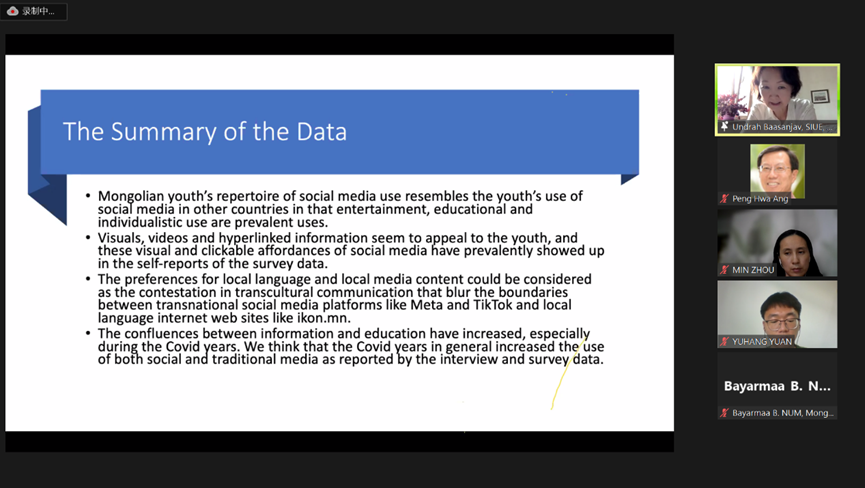
Dr. Undrah Baasanjav and colleagues explore the impact of digital media use by Mongolian youth, especially the college student population, on the socio-political engagement of Mongolian youth. She expressed that although a large number of Mongolian young people use Facebook as a social media, restricted by local legal regulations, they are unable to express themselves effectively on social media. In this context young people don't know how to interact. So, it is necessary to improve media literacy as well as change the legal environment.
Speaker:
Yuhang Yuan Beijing Normal University, China
Pressing the Regulatory Button: Subject Relationship and Power Interaction in Didi's Regulatory Practice from the Perspective of Stakeholders
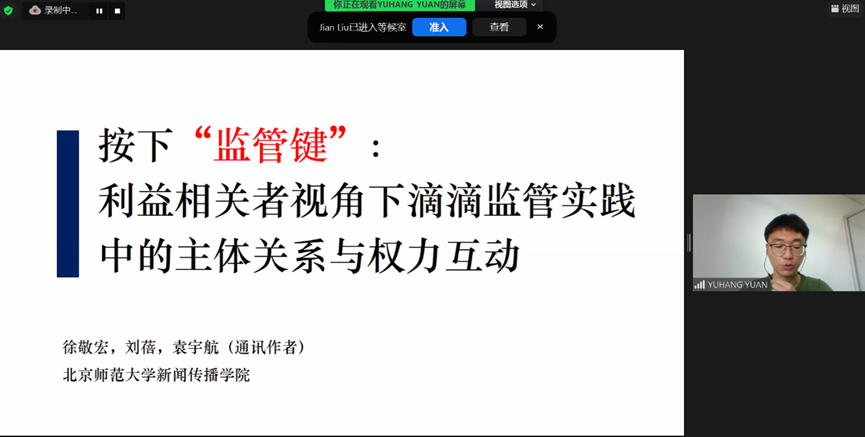
Professor Xu Jinghong and colleagues of Beijing Normal University focus on the regulation of the “DiDi”platform from a stakeholder perspective. Exploring how relations and power interactions in practice facilitate “Didi” has grown from a startup to one of major digital infrastructures.
Speaker:
Furui Wang, School of International Studies, Zhejiang University, Hangzhou, China,
Legislative discourse of industrial digitalisation in the European Union and China: a sociosemiotic perspective
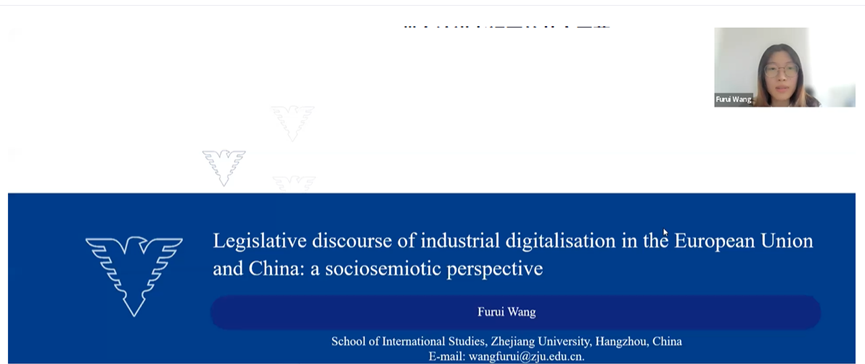
Furui Wang through the comparison of laws related to digitization in different cultures in the EU and China, and the analysis of data collection. She expressed that EU and China hold different principles on data, human rights, governance map, national security and national sovereignty.
The second panel:
Governance of digital communications market access, standards and structures
Moderator:Dr. Rui Wang,BNU; Discussant: Dr. Yik Chan Chin, BNU.

Speaker:
Professor Tao Li, Beijing Normal University, China
Multidimensional Perspective, Scientific Connotation and Chinese Practice of Digital Governance
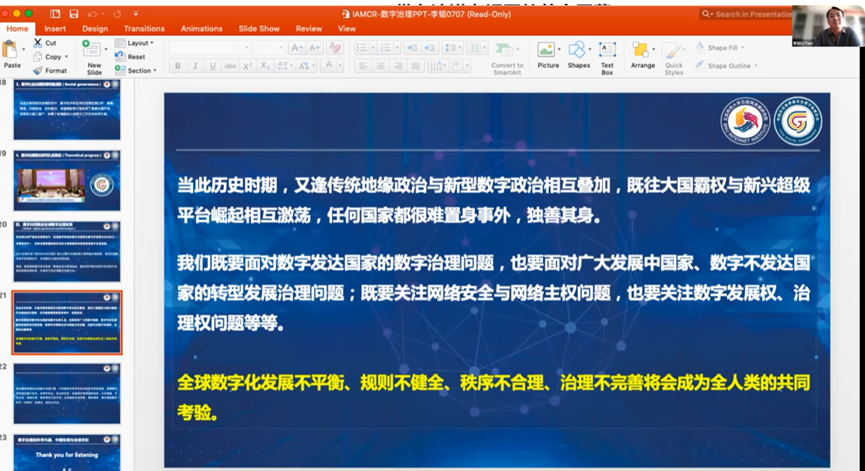
Professor Tao Li show participants the definition, conceptual framework, and governance principles of digital governance in a cross-disciplinary manner, taking into account of the cultural backgrounds of different countries.
Speaker:
Dr. He Qing, Beijing Post Communication University and Dr. Yik Chan Chin, Beijing Normal University
Digital Platform’s Personal Information Protection and Antitrust Regulatory Boundary
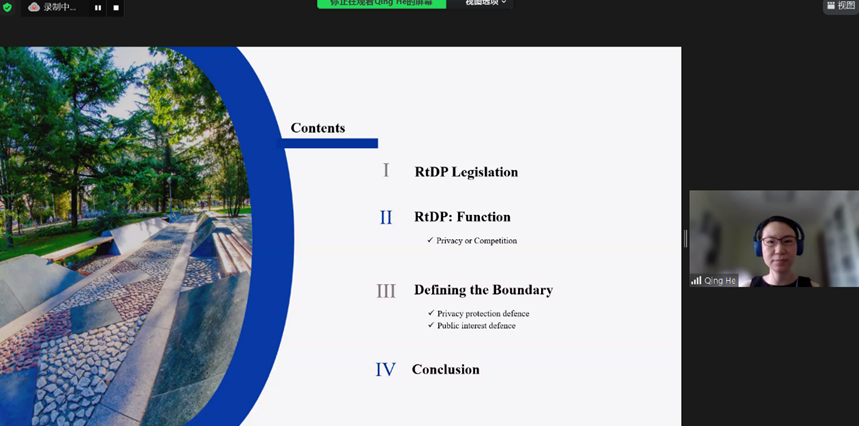
They explored the boundaries of personal information protection and antitrust regulation on digital platforms through comparing the differences and similiarities of EU, China and US’s right to data protability (RTDP) legislations and practices, exmaning their features, functions, and definitions of boundaries.
Speaker:
Dr Niels ten Oever - University of Amsterdam, Netherland
The standardisation of lawful interception technologies in the 3GPP: interrogating 5G and surveillance amid US-China competition
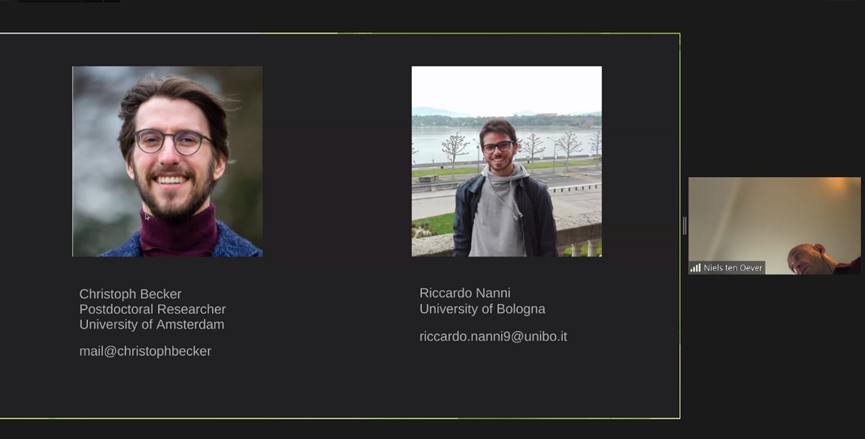
Three researchers examine the issue of 5G and surveillance through the geopolitical competitions between the United States and China. They propose that further integration of standardization of lawful intercept technologies could lead to an easing of geopolitical tensions, especially since all actors already work together in the3GPP. However, to increase the democratic legitimacy in the production of the infrastructures by increased civil society participation in the practice should seriously be considered.
Speaker:
Dr. Swati Jaywant Rao Bute, Jagran Lakecity University, Bhopal - India
Content of movies and web series of OTT platforms in India and controversies related to wrong representation of Indian culture – Case study
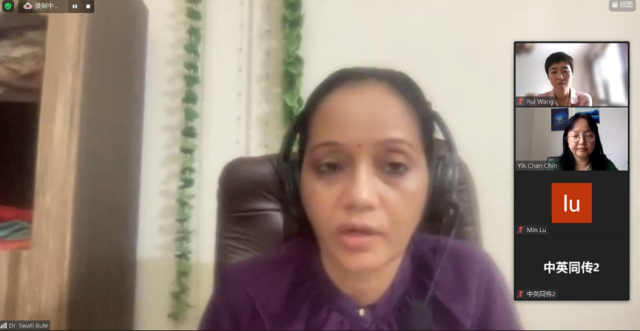
Dr. Swati Jaywant Rao Bute proposed that in the context of digital technology closely connecting different countries and cultures worldwide, it is worth thinking about how digital media platforms can appropriately communicate across borders and cultures.
The third panel:
Digital governance of the AI.
Moderator: Dr. Qian Li, BNU;Discussant: Dr. Yi-Cheng Zhu, BNU

Speaker:
Dr. Fei Shen, City University of Hong Kong, China
AI Technologies and Public Opinion: Social bots in global politics
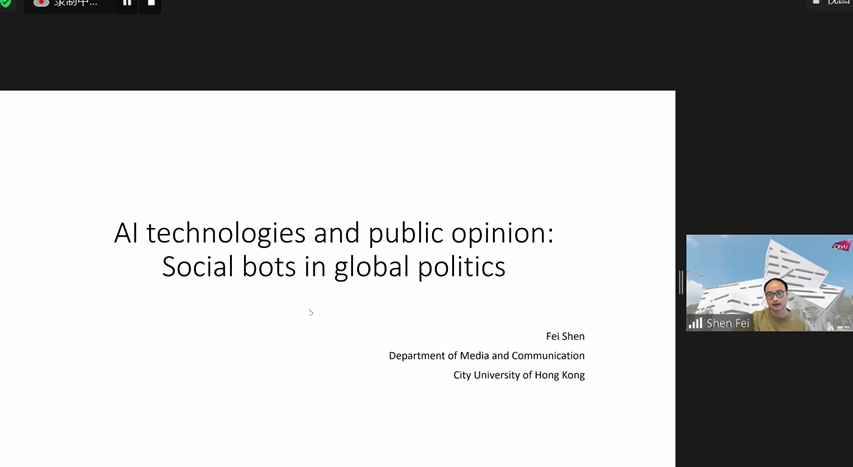
Dr. Shen predicted that as technology develops further, future social media bots will become even more brilliant.
Speaker:
Dr. José Alarcón, Universidad de Educación a Distancia, Spain
Digital Governance by the Generalized Other
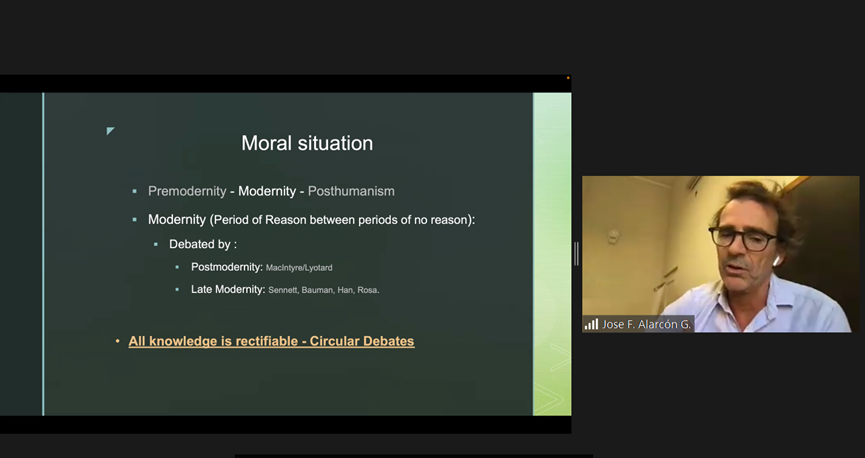
Dr. Alarcón discussed new features such as moral ethics and modernity in the digital world. And He proposes a new strategy where consensus can be reached by gathering voices.
Speaker:
Prof. Ye Wu, Beijing Normal University, China
Transparency of Government Media Information and Social Emotions in Public Health Emergencies
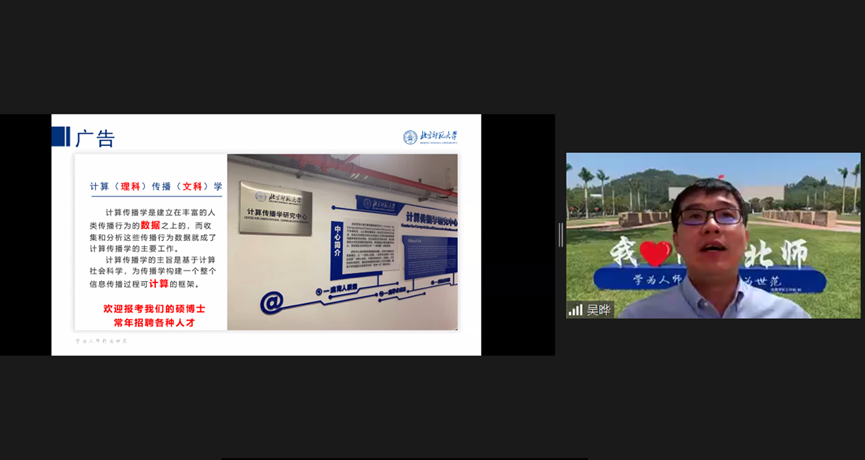
Professor Wu collected and coded information about the impact of the media's transparency in publishing information related to the pandemic on the audience, and the reactions of users who posted in Twitter and “Weibo”, and the corresponding user commentary data during the pandemic.
The data suggest that the comprehensiveness and granularity of information in the political media when disclosing epidemic data has an impact on audience sentiment.
Speaker:
Prof. Xiaofan Liu, City University of Hong Kong, China
Dark Web: the regulated and the (self) regulation
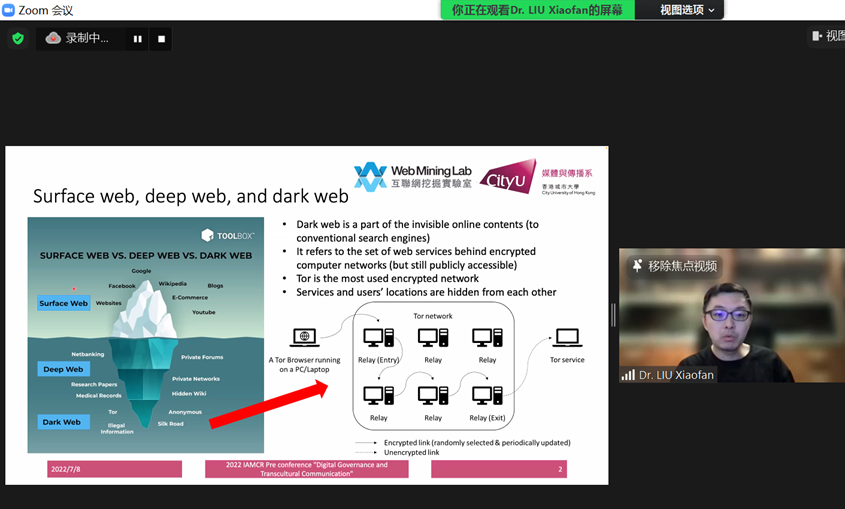
Professor Liu analyzed the (self-)regulation of the dark web and concluded by suggesting possible future directions for the dark web.
Final panel:
Digital Governance and Public Service Media in an Age of Platformisation
Moderator: Prof. Fiona Martin, Sydney University, Australia.
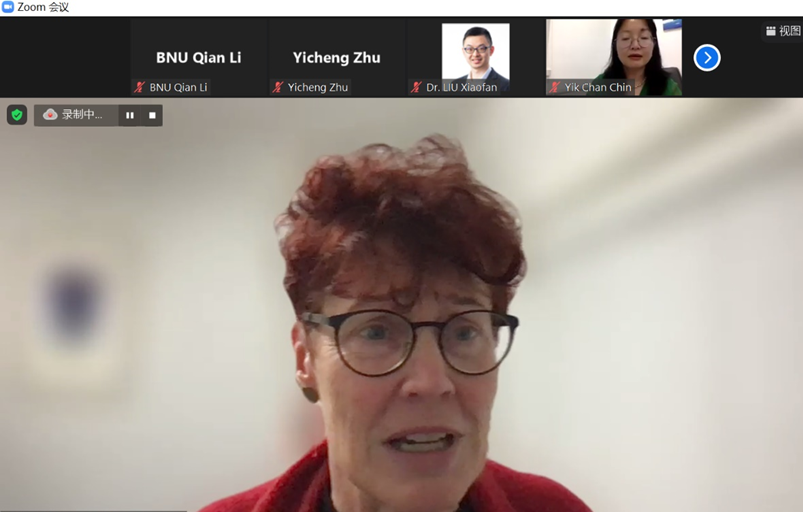
Speaker:
Professor Victor Pickard , Annenberg, University of Pennsylvania, USA
Another Media System is Possible: Ripping Open the Overton Window from Platforms to Public Broadcasting
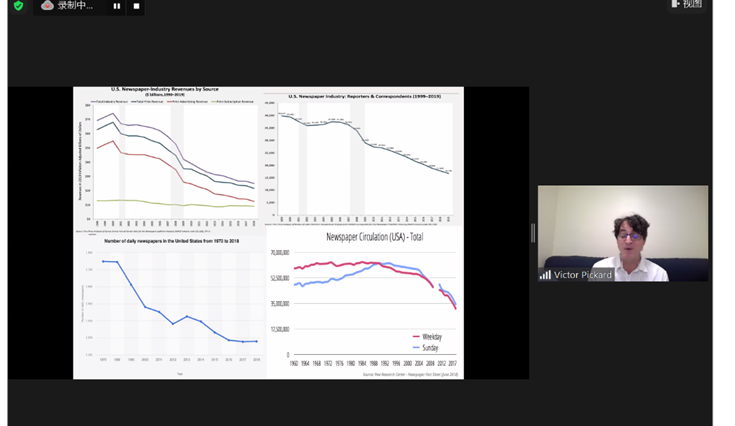
Professor Pickard expressed that it is essential not only to make sure that news is produced, but also to understand how news is distributed and to make sure that the community can reach the news and the digital infrastructure can connect to the Internet. He also discussed algorithmic governance issues and participation dimensions. Prof Pickwrd concludes with the question: How can we ensure that people are actually engaged with the media once it is produced?
Speaker:
Professor Terry Flew, University of Sydney, Australia
Digital Public Spheres: New Life for an Old Debate?
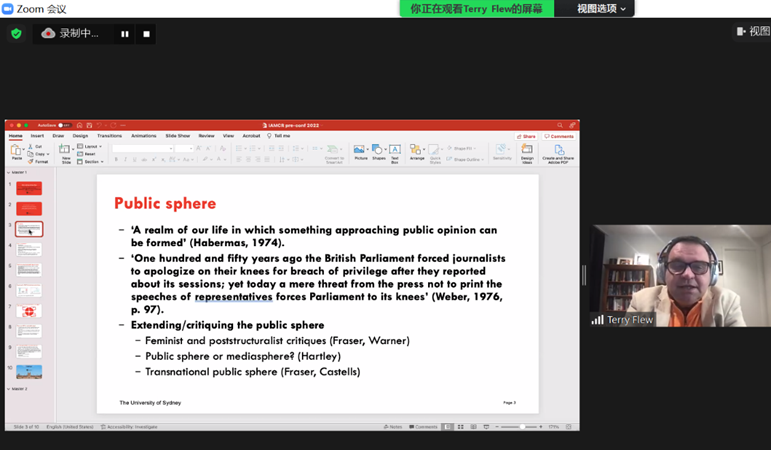
Professor Flew suggested that journalism must take steps to gain the public's trust. And the public service media still faces challenges of legitimacy and universality, as well as partisanship and culture wars.
Speaker:
Erik N. Martin, FAS Impact Fellow and DayOne Project, USA
Platform power and public service broadcasting
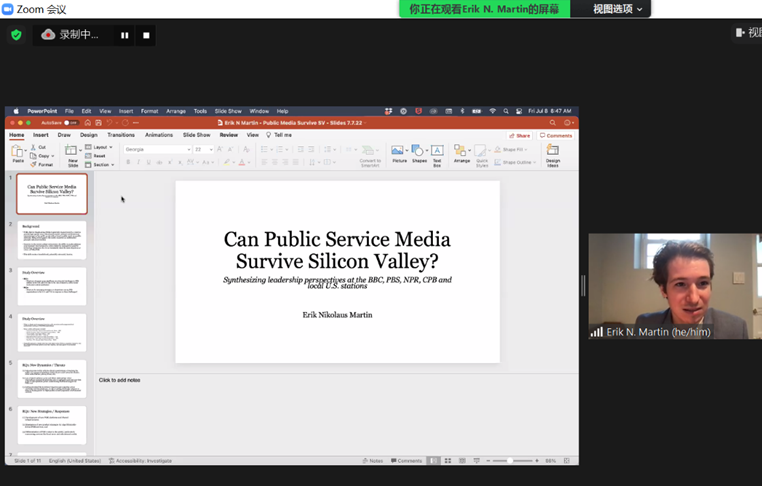
Erik argued that public service media organizations are now in a precarious position and face losing their role as a tool for democratic consultation independent of commercial entities. Erik expressed the view that not all public media ills should necessarily be blamed on certain platforms, but that there is certainly a need to address the dynamics of underserved communities. For example, the LGBT community on platforms is an issue in public media and remains an area that needs to be seriously addressed and thought about.
Speaker:
Dr Maria Michalis, University of Westminster, UK
Video on demand and the future of public service media
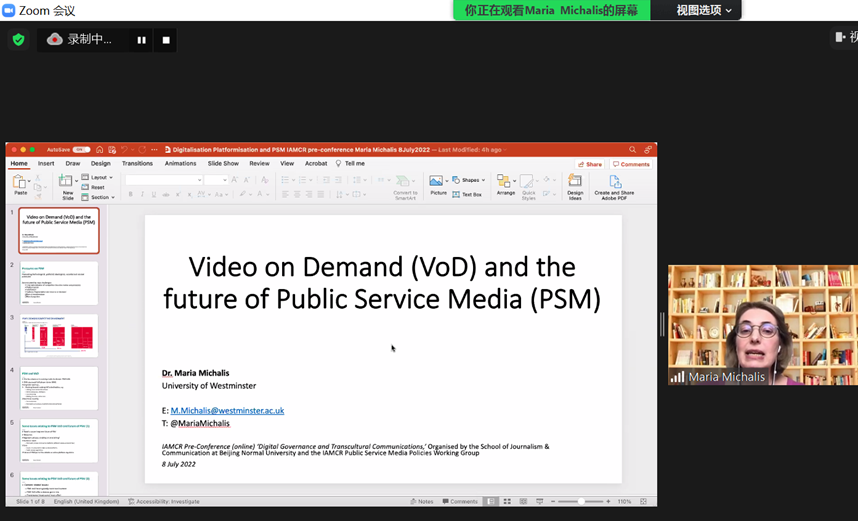
Dr Michalis indicates that public services require strong political commitment. Streaming platforms such as video-on-demand are a core aspect of public service and media digital strategies. An important part of this depends on how public service media develop video-on-demand players.
Dr. Michalis emphasized that the future of public service media cannot be treated isolatedly , and that the future of public service media is linked to the governance of online platforms.
Speaker:
Dr Anis Rahman, University of Washington, USA
Decolonizing the internet? The ground up publics in digital infrastructures and data governance
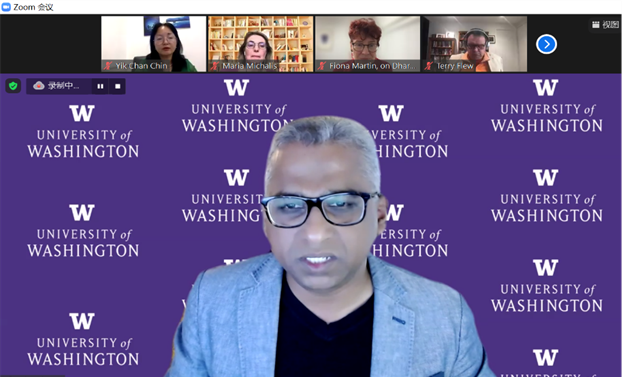
Dr. Rahman suggested that we need to focus more on the most miniature-scale public service Internet platforms with community-based units, and advocated for communities led digital infrastructure and data governance initiatives.
End of the pre-conference.
Group photo
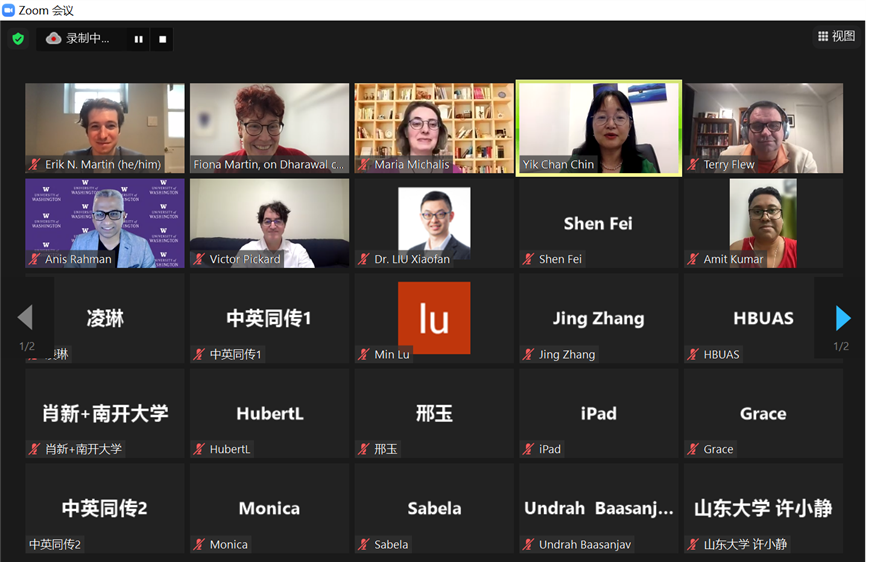
Dr. Yik Chan Chin, Dr. Fiona Martin and Dr. Anis Rahman on behalf of the Beijing Normal University and IAMCR’s Public Service Media Policies Working Group expressed their gratitudes for the organizers and speakers of the very stimulating and efficient pre conference, and look forward to future interactions and collaborations among scholars.
Conference Video Link:
Opening + Keynote speech
https://www.bilibili.com/video/BV1ha411n7ni/?vd_source=5c63b5b4ae1a81dbd0913ddc72159e40
Panel1
https://www.bilibili.com/video/BV1Df4y1d7R5/?vd_source=5c63b5b4ae1a81dbd0913ddc72159e40
Panel2
https://www.bilibili.com/video/BV1EY4y1J7fw/?vd_source=5c63b5b4ae1a81dbd0913ddc72159e40
Panel3
https://www.bilibili.com/video/BV1Ha411n7dm/?vd_source=5c63b5b4ae1a81dbd0913ddc72159e40
Panel4
https://www.bilibili.com/video/BV1mT411g76h/?vd_source=5c63b5b4ae1a81dbd0913ddc72159e40v




 京ICP备13009620号
京ICP备13009620号